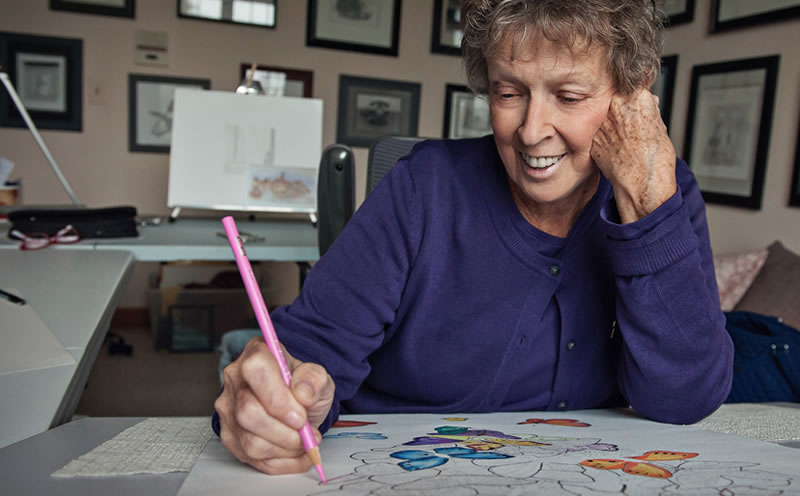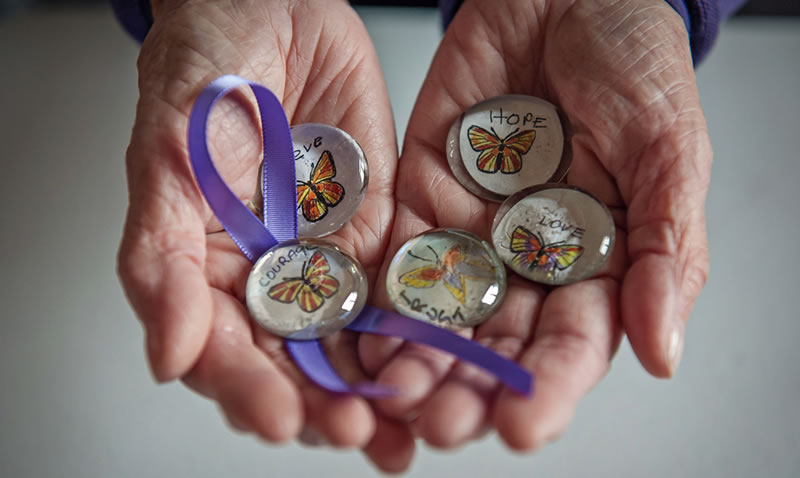The Act of Sharing

A patient spreads hope, humor and art to find joy in each day
Rose Mary Worthen was cleaning her kitchen when a sharp pain nearly knocked her to the floor. Fearing a heart attack, her family doctor sent her in an ambulance to the emergency department at Michigan Medicine. Tests proved her heart was strong and not the source of her pain.
She was diagnosed with stage 4 pancreatic cancer that had spread into her lymph nodes. Her response to the shocking news: "OK, what do I do?"
Worthen was connected with Vaibhav Sahai, MBBS, M.S., a medical oncologist at the Rogel Cancer Center, who laid out an aggressive treatment plan. He explained that more than 50 percent of patients with advanced pancreatic cancer live less than a year from their time of diagnosis.
But here she is, four years later.
Personalized Medicine
Worthen began standard chemotherapy. She did exceptionally well, tolerating the drugs with few side effects and responding to treatment.
"After close to a year on a single regimen without progression, we began to suspect she may have an underlying (genetic) mutation," says Sahai.
A genomic analysis confirmed Sahai's instinct: Worthen is one of the 5-7 percent of pancreatic cancer patients with a mutation in a BRCA gene. The gene responsible for the development of her cancer is also why she has responded so well to treatment.

Four tips from a cancer veteran:
1. Laughter is some powerful medicine. Find humor when you can.
2. Be proactive. Don’t just accept what the doctor, or anybody, says. Do some research. Ask questions. If you don’t understand what they’re saying, have them print something out so you can read it. If you still don’t understand it, ask another doctor. Take control.
3. Build a support team. Look at your family, your friends and the therapists at the Rogel Cancer Center. Lean on that support. That’s so important.
4. Keep going. Learn every day. Get up in the morning and dust your furniture or clean your house or whatever feels like your routine. Get out of your own head and live life.
"Finding the BRCA mutation opened another treatment modality," says Sahai.
Another year passed on the new, oral medication. Only the original mass on her pancreas remains. Her metastatic cancer is not even visible. Worthen continues living a high-quality life despite her stage 4 diagnosis. It is difficult to predict how or when her illness will progress.
"I love life and have no idea when it's going to be taken away. I could give up, but that’s not me. That's not the way this animal was built. So I keep on going," she says.
Artistic Connections
Worthen is passionate about art, an interest that reignited when Rogel Cancer Center art therapist Melinda Hallenbeck-Kostecky approached her one afternoon during infusion to see if a craft project might help keep her mind off things.
Butterflies became a new focus. Worthen began making butterfly charms to hand out to other patients at the cancer center. The act of sharing gives her a lift.
"I walk up to people and put them in their hands," she says. "And I say: 'You’ve just been stoned. Now you can never tell people you’ve never been stoned.' People think it's hysterical."
These personal encounters keep her going.
To fuel her artistic passion, her partner, Jerry, has converted a room in the couple’s home into a lightfilled art studio where Worthen spends hours turning out beautiful pen and ink drawings of landscapes and wildlife. A framed character study of Jerry looks down from the wall.
Coping with Cancer
Humor helps Worthen fend off the unknown during her treatment. When she noticed that people get uncomfortable hearing the word "cancer," she renamed her disease "Joshua" and jokes that she carries him with her.
But it’s not all jokes. There are days she can’t find laughter amid the uncertainty of her health.
“Do I have bad days? You bet I do,” says Worthen. “I guess all of us who have cancer go through all of these emotions. But I refuse to give in to them. I just refuse.”
A strong support network helps Worthen cope. She keeps in close contact with her children and grandchildren, and Jerry has been by her side at every turn.
“He pushes me to keep going, keep a normal schedule, keep doing things,” says Worthen. “He’ll say: ‘We’re going to get through this one step at a time.’”
Group and individual counseling sessions at U-M’s Rogel Cancer Center, led by Claire Casselman, LMSW, have helped too.
“Cancer brings up your past. It brings up where you want to go with your life. And now you’re being told that you may not be able to go there,” Worthen says. “You’ve got to have somebody to dump it on. And somebody who can give you good feedback, not just: ‘Oh honey you’re going to be fine.’ No. I’m not going to be fine. I have cancer.”
Despite it all, Worthen looks for joy in every day. Also, “I stamp my feet and scream a lot,” she laughs.
